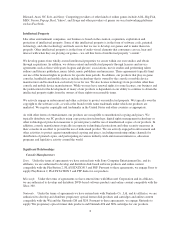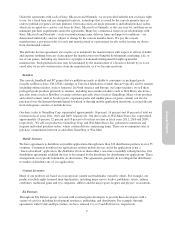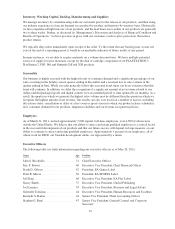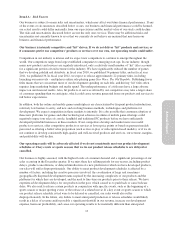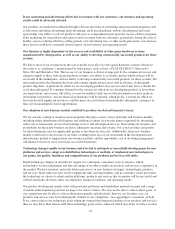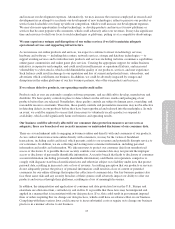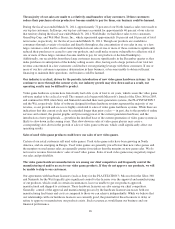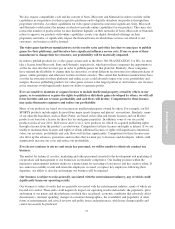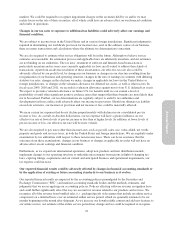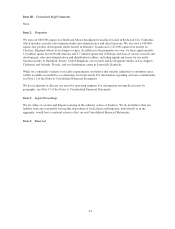Electronic Arts 2011 Annual Report Download - page 94
Download and view the complete annual report
Please find page 94 of the 2011 Electronic Arts annual report below. You can navigate through the pages in the report by either clicking on the pages listed below, or by using the keyword search tool below to find specific information within the annual report.Acquisitions, investments and other strategic transactions could result in operating difficulties, dilution to
our investors and other negative consequences.
We expect to continue making acquisitions or entering into other strategic transactions including (1) acquisitions
of companies, businesses, intellectual properties, and other assets, (2) minority investments in strategic partners,
and (3) investments in new interactive entertainment businesses (for example, online and mobile publishing
platforms) as part of our long-term business strategy. These transactions involve significant challenges and risks
including that the transaction does not advance our business strategy, that we do not realize a satisfactory return
on our investment, that we acquire unknown liabilities, or that we experience difficulty in the integration of
business systems and technologies, the integration and retention of new employees, or in the maintenance of key
business and customer relationships of the businesses we acquire, or diversion of management’s attention from
our other businesses. These events could harm our operating results or financial condition.
Future acquisitions and investments could also involve the issuance of our equity and equity-linked securities
(potentially diluting our existing stockholders), the incurrence of debt, contingent liabilities or amortization
expenses, write-offs of goodwill, intangibles, or acquired in-process technology, or other increased cash and
non-cash expenses, such as stock-based compensation. Any of the foregoing factors could harm our financial
condition or prevent us from achieving improvements in our financial condition and operating performance that
could have otherwise been achieved by us on a stand-alone basis. Our stockholders may not have the opportunity
to review, vote on or evaluate future acquisitions or investments.
We may be subject to claims of infringement of third-party intellectual property rights, which could harm
our business.
From time to time, third parties may assert claims against us relating to patents, copyrights, trademarks, personal
publicity rights, or other intellectual property rights to technologies, products or delivery/payment methods that
are important to our business. Although we believe that we make reasonable efforts to ensure that our products
do not violate the intellectual property rights of others, it is possible that third parties still may claim
infringement. For example, we may be subject to intellectual property infringement claims from certain
individuals and companies who have acquired patent portfolios for the sole purpose of asserting such claims
against other companies. In addition, many of our products are highly realistic and feature materials that are
based on real world examples, which may be the subject of intellectual property infringement claims of others.
From time to time, we receive communications from third parties regarding such claims. Existing or future
infringement claims against us, whether valid or not, may be time consuming and expensive to defend. Such
claims or litigations could require us to pay damages and other costs, stop selling the affected products, redesign
those products to avoid infringement, or obtain a license, all of which could be costly and harm our business. In
addition, many patents have been issued that may apply to potential new modes of delivering, playing or
monetizing game software products and services, such as those that we produce or would like to offer in the
future. We may discover that future opportunities to provide new and innovative modes of game play and game
delivery to consumers may be precluded by existing patents that we are unable to license on reasonable terms.
From time to time we may become involved in other legal proceedings, which could adversely affect us.
We are currently, and from time to time in the future may become, subject to legal proceedings, claims, litigation
and government investigations or inquiries, which could be expensive, lengthy, and disruptive to normal business
operations. In addition, the outcome of any legal proceedings, claims, litigation, investigations or inquiries may
be difficult to predict and could have a material adverse effect on our business, operating results, or financial
condition.
Our business is subject to increasing regulation and the adoption of proposed legislation we oppose could
negatively impact our business.
Legislation is continually being introduced in the United States at the local, state and federal levels for the
establishment of government mandated rating requirements or restrictions on distribution of entertainment
software based on content. To date, most courts that have ruled on such legislation have ruled in a manner
favorable to the interactive entertainment industry. Other countries have adopted or are considering laws
18


